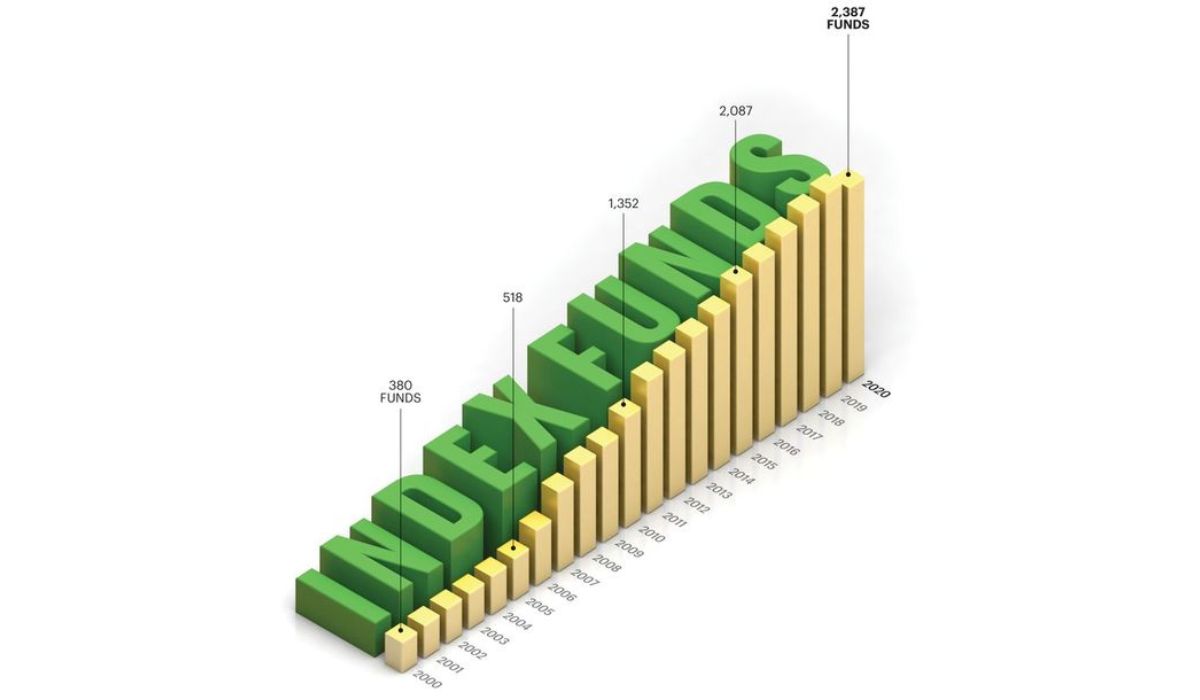Welcome to the world of smart investing! Are you ready to explore a financial avenue that offers long-term growth potential with minimal effort? Index funds might just be your ticket to building wealth steadily over time. In this blog post, we will delve into why index funds are considered the perfect investment choice for those looking to grow their money consistently. Let’s uncover the ins and outs of index funds together and discover how they can pave the way towards a financially secure future.
Why Index Funds Are the Perfect Investment for Long-Term Growth
When it comes to investment options, index funds stand out as a top choice for long-term growth. These funds offer a simple yet effective way to diversify your portfolio without the need for constant monitoring or complex decision-making. By tracking the performance of a specific market index, such as the S&P 500, index funds provide broad exposure to various companies within that index.
One key advantage of investing in index funds is their low costs compared to actively managed funds. With lower management fees and expenses, more of your money stays invested and working for you over time. Additionally, by spreading your investment across multiple companies within an index, you reduce the risk associated with individual stock picking.
Index funds also tend to deliver consistent returns over the long term, aligning well with investors seeking steady growth rather than chasing quick wins in volatile markets. Whether you’re a novice investor or seasoned pro looking to simplify your strategy, index funds offer stability and potential for wealth accumulation over time.
Understanding Index Funds
Index funds are an essential component of a well-rounded investment portfolio. They offer investors the opportunity to track the performance of a specific market index, such as the S&P 500, by holding a diversified collection of stocks or bonds. These funds are passively managed, meaning they aim to replicate the returns of the underlying index rather than trying to outperform it through active trading.
For those new to investing, understanding index funds can be a game-changer. Instead of hand-picking individual stocks or constantly monitoring market trends, investors can simply buy into an index fund and benefit from broad market exposure with minimal effort. This passive approach often results in lower fees compared to actively managed funds, making them an attractive option for long-term growth.
In essence, index funds provide an easy way for investors to gain exposure to various sectors of the economy without having to worry about picking winners and losers. By diversifying across multiple securities within an index, investors can mitigate risk and potentially achieve more stable returns over time.
Definition of an Index Fund
Index funds are a popular investment option that tracks the performance of a specific market index, like the S&P 500. These funds aim to replicate the returns of the index they follow rather than trying to outperform it actively. Essentially, an index fund is a passive investment strategy designed to match the market’s performance.
By investing in an index fund, you’re essentially buying a small piece of all the companies within that particular index. This diversification helps spread risk across multiple assets and industries, reducing your exposure to individual stock volatility.
Unlike actively managed funds where managers make decisions on which stocks to buy and sell, index funds operate on preset rules based on their respective benchmarks. This simplicity typically results in lower fees compared to actively managed funds since there’s less hands-on management involved.
Understanding the concept behind an index fund is crucial for investors looking for a low-cost way to gain exposure to various markets while aiming for long-term growth potential without constantly monitoring individual stocks.
How Index Funds Work
Index funds are a popular investment option that tracks the performance of a specific index, like the S&P 500. These funds aim to replicate the returns of the underlying index by holding all or a representative sample of its components.
When you invest in an index fund, you’re essentially buying a small piece of multiple companies within that index. For example, if you invest in an S&P 500 index fund, you own shares in all 500 companies included in the index.
The beauty of index funds lies in their passive management approach. Unlike actively managed funds where portfolio managers make decisions to beat the market, index funds simply mirror the performance of their respective indexes.
By diversifying your investments across various sectors and industries through an index fund, you spread out your risk and reduce exposure to individual stock volatility. This can help increase stability and potentially improve long-term growth for your investment portfolio.
Advantages of Index Funds
Index funds offer several advantages for investors looking to achieve long-term growth. One of the key benefits is their low fees compared to actively managed funds, making them a cost-effective investment option. Additionally, index funds provide diversification by tracking a specific market index, reducing individual stock risk.
Another advantage of index funds is their passive management style, which means less frequent buying and selling, leading to lower transaction costs and potentially higher returns in the long run. This hands-off approach also eliminates the need for constant monitoring and decision-making on the investor’s part.
Furthermore, index funds are known for their transparency as they typically disclose their holdings regularly. This transparency allows investors to know exactly what they are investing in at any given time. These advantages make index funds an attractive choice for those seeking steady growth over time without the stress of actively managing their investments.
Best Index Funds to Invest In
When it comes to choosing the best index funds to invest in, there are several top performers worth considering. Vanguard Total Stock Market Index Fund (VTSAX) is a popular choice for its broad exposure to the U.
S. stock market. Investors looking for international diversification may opt for the Vanguard FTSE All-World ex-US Index Fund (VFWAX).
For those interested in tech companies, the Fidelity MSCI Information Technology Index ETF (FTEC) offers exposure to leading tech giants like Apple and Microsoft. If you prefer sustainable investing, the iShares ESG MSCI USA Leaders ETF (SUSL) focuses on companies with strong environmental, social, and governance practices.
Investors seeking stability during market downturns might consider the iShares Edge MSCI Minimum Volatility USA ETF (USMV). Each of these index funds has its own unique characteristics and potential for long-term growth based on your investment goals and risk tolerance levels.
Overview of Top Performing Index Funds
When it comes to investing in index funds, having an overview of the top-performing options can help you make informed decisions. Vanguard Total Stock Market Index Fund (VTSAX) is a popular choice for its broad exposure to the U.
S. stock market, providing diversification across various sectors and market capitalizations.
Another standout performer is the SPDR S&P 500 ETF Trust (SPY), which tracks the performance of the S&P 500 index, offering investors exposure to some of the largest companies in the U.
S. with low expenses.
For those looking to invest internationally, consider iShares MSCI EAFE ETF (EFA), which follows developed markets outside of North America. This fund provides access to companies in Europe, Australasia, and the Far East.
Investors seeking growth opportunities may find Schwab U.
S. Small-Cap ETF (SCHA) appealing as it focuses on small-cap stocks within the U.
S., potentially offering higher returns but also increased volatility.
Factors to Consider When Choosing Index Funds
When choosing index funds for your investment portfolio, there are several key factors to consider. First and foremost, look at the fund’s expense ratio. Lower expenses mean more of your money stays invested.
Next, consider the fund’s tracking error. This measures how closely the fund mirrors its benchmark index. A lower tracking error indicates better performance alignment.
Diversification is crucial in index fund selection. Ensure the fund holds a wide range of assets across different sectors or regions to minimize risk.
Investigate the historical performance of the index fund over various market conditions. Consistent returns over time can indicate reliability.
Review any minimum investment requirements and liquidity considerations to ensure they align with your financial goals and timeline.
Choosing the right index funds involves careful consideration of these factors to make informed investment decisions that suit your long-term growth objectives.
Investing in Index Funds
When it comes to building wealth over the long term, investing in index funds is a smart choice. These funds are designed to track a specific market index, offering diversification and potential for growth. Index funds provide an easy way for investors to gain exposure to a broad range of stocks or bonds without the need for constant monitoring.
One of the key advantages of index funds is their lower costs compared to actively managed funds. With lower fees, more of your money stays invested and can compound over time. Additionally, index funds offer better returns over the long run due to their passive management style.
Diversification is another benefit that index funds bring to the table. By investing in multiple companies within an index, you spread out your risk and reduce the impact of any single stock’s performance on your overall portfolio.
Consider exploring different types of indexes when selecting which fund to invest in based on your financial goals and risk tolerance level. Conduct thorough research before making any investment decisions – knowledge is power when it comes to achieving financial success through index fund investments!
Steps to Research and Analyze Index Funds
When considering investing in index funds, conducting thorough research and analysis is crucial to making informed decisions. Start by defining your investment goals and risk tolerance. Determine the timeframe for your investments to align with long-term growth strategies.
Next, research different index funds available in the market. Look into their historical performance, expense ratios, and holdings to understand how they align with your financial objectives. Consider factors like diversification across industries and regions for a well-rounded portfolio.
Analyze the track record of the index fund managers and their approach to managing assets. Evaluate past returns compared to benchmark indices for consistency in performance. Assess any fees associated with the fund to ensure they are reasonable and not eroding potential gains.
Consult with financial advisors or experts if needed to gain further insights into specific index funds that match your investment criteria. Continuous monitoring and adjustments may be necessary based on changing market conditions or personal financial goals.
Selecting the Right Index Fund
Selecting the right index fund is crucial for long-term investment success. Start by defining your investment goals and risk tolerance. Consider factors like expense ratios, tracking error, and fund size when evaluating different index funds.
Research the historical performance of each fund to gauge its consistency over time. Look at how well it tracks its benchmark index and compare it to competitors in the same category.
Diversification is key – choose an index fund that provides exposure to a broad range of assets across various sectors. This can help reduce risk and increase potential returns over time.
Don’t overlook the importance of fees – opt for funds with low expense ratios to maximize your overall returns. Take into account any additional costs associated with buying or selling shares as well.
Consult with a financial advisor if needed to get personalized advice tailored to your specific financial situation and goals. Selecting the right index fund requires thorough research and careful consideration before making a decision on where to invest your hard-earned money.
Making the Purchase
When it comes to making the purchase of an index fund, the process is typically straightforward and can be done through various investment platforms or brokerage firms.
First, you’ll need to open an account with a reputable provider that offers access to the specific index fund you’re interested in investing in. This could be a traditional brokerage account or an online investment platform.
Next, research the available index funds and compare their performance history, fees, and underlying assets to determine which aligns best with your long-term financial goals.
Once you’ve selected the right index fund for your portfolio, proceed with making the purchase by inputting the desired amount of investment either as a lump sum or setting up recurring contributions for dollar-cost averaging.
After completing the purchase transaction, monitor your investment periodically but avoid making impulsive decisions based on short-term market fluctuations. Remember that investing in index funds is geared towards long-term growth and wealth accumulation.
Benefits of Index Funds
When it comes to investing in index funds, there are several benefits that make them a popular choice for long-term growth. One significant advantage of index funds is their lower costs compared to actively managed funds. With lower expense ratios and minimal turnover, investors can keep more of their returns.
Another benefit of index funds is the potential for better returns over time. By tracking a specific market index, these funds tend to perform consistently with the overall market trends. This passive approach often results in competitive returns without the need for constant monitoring or active management.
Diversification and risk mitigation are also key advantages of investing in index funds. By holding a diverse range of assets within one fund, investors can spread out their risk across various sectors and industries. This diversification helps protect investments from the volatility of individual stocks or sectors.
The benefits of index funds make them an attractive option for investors looking to build wealth steadily over time while minimizing costs and risks associated with traditional investing methods.
Lower Costs
Index funds are known for their cost-effectiveness, making them an attractive option for long-term investors. One of the key advantages of investing in index funds is the lower costs associated with them. Traditional actively managed funds often come with higher fees due to the active management involved in picking and choosing investments. In contrast, index funds simply aim to replicate a specific market index, resulting in lower expenses.
By tracking a particular index’s performance rather than trying to outperform it, index funds can keep costs down. These lower fees lead to more of your money being put to work for you, ultimately boosting your overall returns over time. Additionally, since there is less frequent buying and selling within index funds compared to actively managed ones, transaction costs are reduced as well.
Investing in low-cost index funds not only helps maximize your investment returns but also aligns with the philosophy of long-term growth through simplicity and efficiency. The savings on fees can have a significant impact on your portfolio’s value over the years, emphasizing the importance of considering cost when selecting investment options.
Better Returns
When it comes to investing in index funds, one of the key attractions is the potential for better returns. Index funds offer a way to passively invest in a diverse range of assets, which can help spread risk and maximize growth opportunities over the long term.
By tracking a specific market index, such as the S&P 500 or the NASDAQ, index funds aim to replicate the performance of that index. This passive approach often results in lower fees compared to actively managed funds while still potentially delivering competitive returns.
Investors who choose index funds benefit from broad market exposure without having to pick individual stocks. This diversification across various sectors and industries can help cushion against volatility and increase overall portfolio stability.
Over time, historical data has shown that many top-performing index funds have outperformed actively managed mutual funds due to their low costs and consistent investment strategy. As markets fluctuate, having a well-diversified portfolio through index fund investments can lead to more stable and potentially higher returns for investors looking towards long-term growth opportunities.
Diversification and Risk Mitigation
Diversification is a key benefit of investing in index funds. By spreading your investments across a wide range of assets, you reduce the risk associated with putting all your eggs in one basket. Index funds typically track an entire market or sector, giving you exposure to multiple companies and industries simultaneously.
This diversification helps mitigate individual stock risks since any underperforming stocks are balanced out by the overall performance of the fund. It’s like having a safety net for your investments – if one company falters, it doesn’t have as significant an impact on your overall portfolio.
Additionally, index funds provide automatic diversification without requiring constant monitoring or active management on your part. This passive approach can be especially beneficial for long-term investors looking to steadily grow their wealth while minimizing unnecessary risks associated with picking individual stocks.
Considerations for Index Fund Investing
When considering index fund investing, it’s essential to evaluate your investment goals and risk tolerance. Understand the long-term nature of these funds and how they align with your financial objectives.
Research the historical performance of different index funds to identify those that have consistently outperformed their benchmarks. Diversification is key in reducing risk, so look for funds that track a variety of sectors or asset classes.
Consider the fees associated with each index fund as lower costs can significantly impact your overall returns over time. Timing is crucial when investing in index funds; however, it’s difficult to predict market movements accurately.
Keep in mind that patience is vital when investing in index funds due to their passive management style. Regularly review your investments and make adjustments as needed based on changes in market conditions or personal financial goals.
Fees Associated with Index Funds
When considering investing in index funds, it’s important to be aware of the fees associated with them. Unlike actively managed funds that typically have higher expense ratios due to the active management involved, index funds are known for their low costs.
One key fee to look out for is the expense ratio, which represents the annual operating expenses as a percentage of your investment. Index funds generally have lower expense ratios compared to actively managed funds, making them an attractive option for cost-conscious investors.
In addition to the expense ratio, some index funds may also charge other fees such as sales loads or transaction fees. It’s essential to understand all potential fees before investing in an index fund to ensure you’re comfortable with the overall cost structure and its impact on your returns.
By choosing index funds with low fees, investors can keep more of their returns over time and benefit from compounding growth without being eroded by high costs. When comparing different index fund options, consider not only historical performance but also the fee structure to make an informed decision about where to invest your money.
Timing for Index Fund Investment
Timing for Index Fund Investment is a crucial consideration for investors looking to maximize their returns. One key aspect to keep in mind is that trying to time the market perfectly is nearly impossible. The stock market can be unpredictable, and attempting to buy low and sell high consistently is challenging.
Instead of timing the market, focus on your long-term investment goals when investing in index funds. By staying invested over an extended period, you can benefit from the power of compounding returns. Market fluctuations are normal, but history has shown that markets tend to trend upwards over time.
Another factor to consider is dollar-cost averaging, where you invest a set amount at regular intervals regardless of market conditions. This strategy can help mitigate the impact of volatility on your investments by spreading out your purchases over time.
Remember, consistency and discipline are key when it comes to investing in index funds. Stay committed to your investment plan and avoid making emotional decisions based on short-term market movements.
Conclusion
Investing in index funds can be a smart move for those looking to achieve long-term growth in their investment portfolio. With lower costs, better returns, and built-in diversification, index funds offer a convenient way to access the broad market without the need for active management.
By understanding how index funds work, researching top-performing options, and considering factors like fees and timing, investors can make informed decisions when selecting the right index fund for their financial goals. Whether you are new to investing or a seasoned investor, incorporating index funds into your investment strategy could help you build wealth over time with less stress and effort compared to individual stock picking.
Start exploring the world of index fund investing today and watch your investments grow steadily over the years. Happy investing!
Also Read: The Rise of Mutual Funds: How Marc J Gabelli Revolutionized the Industry.
FAQs on Index Funds
Curious about index funds? Here are some common questions answered:
What is an index fund?
An index fund is a type of mutual fund or exchange-traded fund (ETF) that tracks a specific market index, such as the S&P 500. It aims to replicate the performance of the chosen index by holding similar investments.
How do I invest in an index fund?
Investing in an index fund is easy – you can do so through a brokerage account or a financial advisor. Simply choose the desired index fund, determine how much you want to invest, and make your purchase.
Are index funds suitable for long-term investment goals?
Yes, one of the main advantages of index funds is their potential for long-term growth due to diversification and lower costs compared to actively managed funds.
Do I need a lot of money to start investing in an index fund?
Not necessarily! Many brokerages offer low-cost options for investing in index funds with minimal initial investment requirements.
Can I lose money investing in an index fund?
Like any investment, there are risks involved with investing in an index fund. However, over time, they have historically shown steady growth and resilience through market fluctuations.











